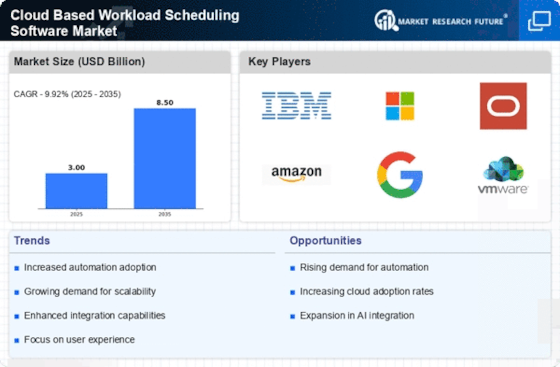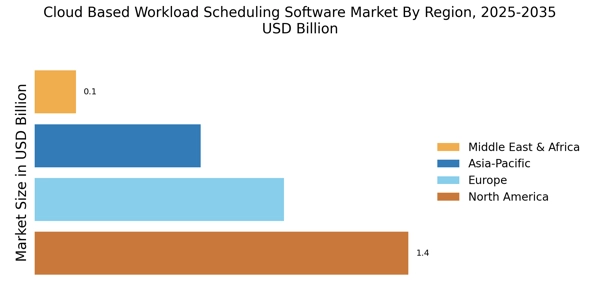Adoption of Hybrid Work Models
The Cloud Based Workload Scheduling Software Market is significantly influenced by the widespread adoption of hybrid work models. As organizations transition to flexible work arrangements, the need for effective scheduling tools becomes increasingly critical. Cloud-based solutions facilitate seamless collaboration among remote and on-site teams, ensuring that workloads are managed efficiently regardless of location. Recent statistics indicate that 70% of companies are now utilizing hybrid work models, which in turn drives the demand for advanced scheduling software. This shift not only enhances employee satisfaction but also optimizes resource utilization, thereby contributing to the growth of the market.
Integration of Advanced Analytics
The Cloud Based Workload Scheduling Software Market is witnessing a transformative shift with the integration of advanced analytics. Organizations are leveraging data-driven insights to enhance their scheduling processes, allowing for more informed decision-making. By utilizing predictive analytics, businesses can anticipate workload fluctuations and allocate resources accordingly. This capability is particularly valuable in industries such as manufacturing and logistics, where operational efficiency is crucial. Reports suggest that companies employing analytics-driven scheduling solutions can achieve up to a 25% reduction in operational costs. As the demand for data-centric solutions continues to rise, the market for cloud-based scheduling software is poised for substantial growth.
Increased Focus on Compliance and Security
The Cloud Based Workload Scheduling Software Market is increasingly shaped by the heightened focus on compliance and security. As organizations migrate to cloud-based solutions, they face the challenge of ensuring that their scheduling processes adhere to regulatory standards. This concern drives the demand for software that not only streamlines scheduling but also incorporates robust security features. Recent findings indicate that 60% of businesses prioritize compliance when selecting scheduling software. Consequently, vendors are enhancing their offerings to include advanced security protocols, thereby fostering trust and encouraging adoption. This trend is likely to bolster the market as organizations seek reliable solutions that meet their compliance needs.
Rising Demand for Efficiency in Operations
The Cloud Based Workload Scheduling Software Market is experiencing a notable surge in demand for operational efficiency. Organizations are increasingly seeking solutions that streamline their scheduling processes, thereby reducing downtime and optimizing resource allocation. According to recent data, companies that implement cloud-based scheduling solutions report a 30% increase in productivity. This trend is driven by the need for businesses to remain competitive in a rapidly evolving landscape, where agility and responsiveness are paramount. As organizations continue to embrace digital transformation, the reliance on cloud-based solutions for workload scheduling is likely to grow, further propelling the market forward.
Growing Need for Scalability and Flexibility
The Cloud Based Workload Scheduling Software Market is propelled by the growing need for scalability and flexibility in business operations. As organizations expand, their scheduling requirements evolve, necessitating solutions that can adapt to changing demands. Cloud-based scheduling software offers the advantage of scalability, allowing businesses to adjust their workloads without significant infrastructure investments. Recent data suggests that 80% of companies prefer cloud solutions for their ability to scale efficiently. This flexibility not only supports growth but also enhances operational resilience, making cloud-based scheduling an attractive option for organizations of all sizes. As the market continues to evolve, the demand for scalable solutions is expected to rise.

















